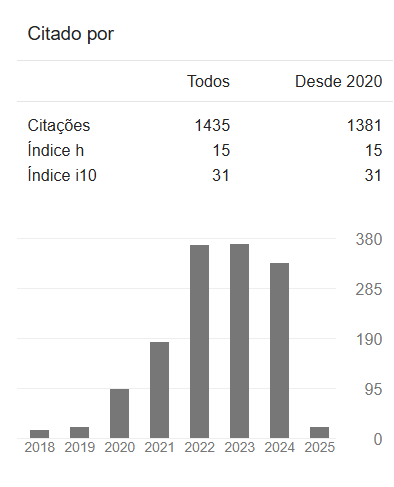LANGUAGE TEACHING FOR SPECIFIC PURPOSES AT IFAL: ANALYSIS OF NEEDS FOR SPANISH AND ENGLISH LANGUAGE USES
DOI:
10.23926/RPD.2526-2149.2020.v5.n2.p743-763.id644Keywords:
Needs analysis, Language teaching for specific purposes, HospitalityAbstract
This research aimed to verify the needs of uses of the Spanish and English languages in the Technological course in Hospitality, from the perceptions of professionals working in the hotel business, foreign tourists and students. The theoretical framework is represented by studies in the areas of language teaching for specific purposes and needs analysis. The methodology was carried out in three stages and semi-structured questionnaires were used as an instrument for data collection and data generation. The results show that hotel employees do not feel prepared to verbally interact with foreign tourists, a fact corroborated by these tourists who point to the need for professionals to acquire the basic vocabulary of the area. In addition, we also realize that students are unaware of their needs in relation to learning these languages. As a conclusion, there is a need to offer training to professionals who already work in the hotel and to reformulate the menus of the two subjects in the hotel.
Downloads
Metrics
References
ABDALLA, Glória Cortés. Ensino de espanhol para o curso de secretariado executivo: análise de necessidades e desafios atuais. In SILVA JÚNIOR, Antonio Ferreira Da: Línguas para fins específicos: revisitando conceitos e práticas. Pontes Editores, Campinas, 2019. p. 117- 131.
BERWICK, Richard. Needs assessment in language programming: from theory to practice. In: JOHNSON, Robert Keith (ed.). The second Languade Curriculum. Cabridge University Press, 1989. p. 48-62.
CELANI, Maria Antonieta Alba. Revivendo a aventura: desafios, encontros e desencontros. In: CELANI, Maria Antonieta Alba; FREIRE, Maximina. M.; RAMOS, Rosinda de Castro Guerra. A Abordagem instrumental no Brasil: um projeto, seus percursos e seus desdobramentos. São Paulo: EDUC, 2009. p. 17-31.
DENZIN, Norman K; LINCOLN, Yvonna S. O planejamento da pesquisa qualitativa: teorias e abordagens. 2° ed. Porto Alegre: Artmed, 2006.
JOHNSON (ed.) The second language curriculum. Cambridge University Press.
HUTCHINSON, Tom.; WATERS Alan. English for Specific Purposes: a learning-centred approach. Cambridge: Cambridge University Press, 1987.
LIMA-DUARTE, Flávia Karolina; GOMES, Luiz Fernando. Interações multimodais em contexto intercultural: uso de tecnologia como recurso didático no processo de ensino-aprendizagem de língua espanhola para fins específicos. In. SILVA JÚNIOR, Antonio Ferreira Da. Línguas para fins específicos: revisando conceitos e práticas. Campinas, SP: Pontes Editores, 2019. p. 279-298.
RAMOS, Rosinda de Castro Guerra. Instrumental no Brasil: A desconstrução de mitos e a construção do futuro. In: FREIRE, Maximina. M, ABRAHÃO,Maria Helena Vieira. e BARCELOS, Ana Maria Ferreira. Linguística aplicada e contemporaneidade. São Paulo, SP: ALAB; Campinas: Pontes Editores, 2005.
RAMOS, Rosinda de Castro Guerra. A história instrumental na PUCSP. In. CELANI, Maria Antonieta Alba; RAMOS, Rosinda de Castro Guerra; FREIRE, Maximina M. A Abordagem Instrumental no Brasil: um projeto, seus percursos e seus desdobramentos. Campinas: Mercado das Letras; São Paulo: EDUC, 2009 Coleção- (As Faces da Linguística Aplicada) v. 10. 2009. p. 35- 45.
RAMOS, Rosinda de Castro Guerra. De instrumental a LinFe: Percursos e equívocos da área no Brasil. In. SILVA JÚNIOR, Antonio Ferreira Da. Línguas para fins específicos: revisando conceitos e práticas. Campinas, SP: Pontes Editores, 2019. p. 23- 41.
ROSSINI, Adriana Marroni Z.P; BELMONTE, Juliana. Panorama do ensino-aprendizagem de Línguas para Fins Específicos: Histórico, Mitos e Tendências. In. LIMA-LOPES, Rodrigo Esteves de. et al. Perspectivas em Línguas para Fins Específicos: Festschrift para Rosinda Ramos. Coleção: Novas Perspectivas em Linguística Aplicada, Vol 41. Campinas: Pontes Editores, 2015. p. 347-359.
SEDETUR (Secretaria de Estado do Desenvolvimento Econômico e Turismo). Secretaria de Estado do Desenvolvimento Econômico e Turismo (SEDETUR), 2020. Disponível em http://www.sedetur.al.gov.br. Acesso em: 07 set. 2020.
SELINKER; Larry. The Interlanguage. In: IRAL, International Review of Applied Linguistics in Language Teaching, 10(3). 1972. p. 209-232.
SILVA JÚNIOR, Antonio Ferreira Da; CASTELLAR, Thays Moreira. Línguas estrangeiras no trabalho de profissionais de turismo em Nova Iguaçu- RJ. In. SILVA JÚNIOR, Antonio Ferreira Da. Línguas para fins específicos: revisando conceitos e práticas. Campinas, SP: Pontes Editores, 2019. p. 189- 210.
VIAN JUNIOR, Orlando. Inglês Instrumental, inglês para negócios e inglês instrumental para negócios. D.E.L.T.A., Vol. 15, N° Especial, 1999. p. 437-457.
VILAÇA, Márcio Luiz Corrêa. Para entender o ensino de inglês para fins específicos: Princípios, características e Ramos. In. SILVA JUNIOR, Antonio Ferreira Da. Línguas para fins específicos: revisando conceitos e práticas. Campinas, SP: Pontes Editores, 2019. p 57- 70.
Downloads
Published
How to Cite
Issue
Section
License
Copyright (c) 2023 A Revista Prática Docente tem o direito de primeira publicação

This work is licensed under a Creative Commons Attribution-NonCommercial 4.0 International License.
Authors who publish in this journal agree to the following terms:
- Authors retain the copyright and grant the journal the right of first publication, with the paper simultaneously licensed under the Licença Creative Commons Attribution allows the sharing of the work with acknowledgment of authorship and initial publication in this journal.
- Authors are authorized to take additional contracts separately, for non-exclusive distribution of the version of the work published in this journal (e.g. publish in institutional repository or as a book chapter), with acknowledgment of authorship and initial publication in this journal.











